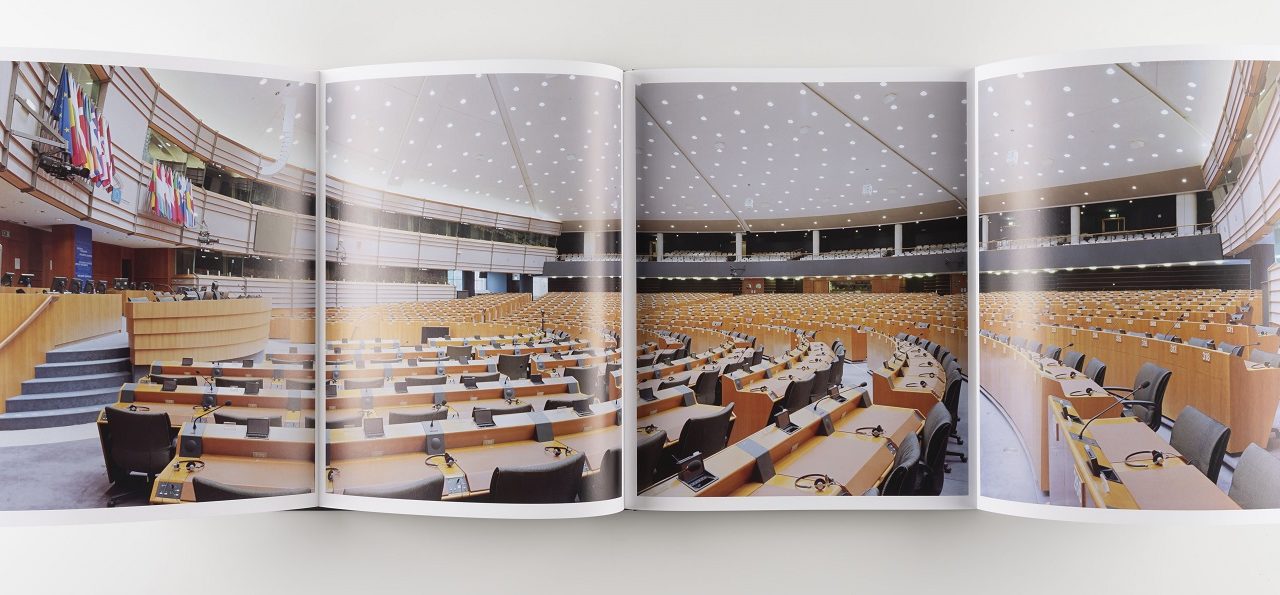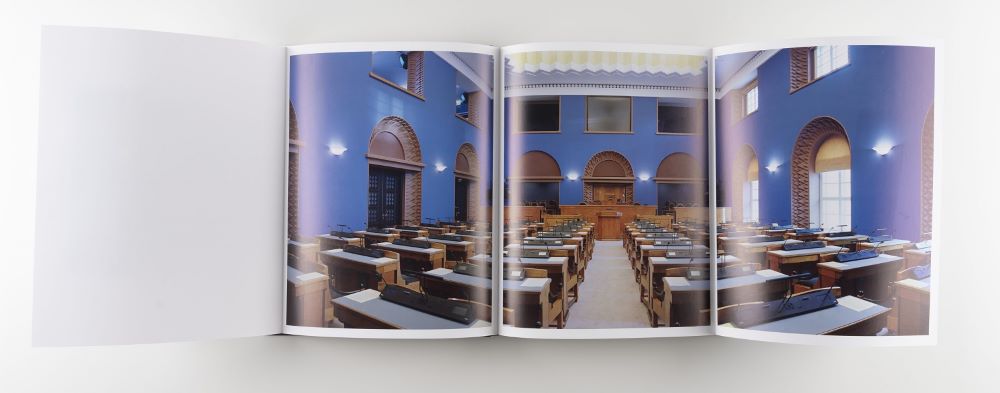Parliaments of the European Union: book launch
15 Apr 2019
Our head of advocacy Isabelle Schwarz spoke at the book launch of the photography book “Parliaments of the European Union” by Nico Bick – which we wrote about earlier. Here follows an edited version of her speech.
”The project is a stark reflection on the role and workings of democracy in Europe, shedding light on some of the anachronisms between built places of power and today’s practices of democracy. Some of the parliaments photographed look like objects misplaced in time. Many were conceived in times that that are no longer here (e.g. communism in Slovenia, dictatorship in Romania) and feel out of sync with contemporary democratic needs, expectations and practice.
It is no secret that democracy is under threat and exposed to increasing internal and external pressures leading to fragmentation and polarization, supported by disinformation and fake news. The same accounts for Europe. As a native European and passionate citizen of Europe, there are three things I want to say tonight, and all three relate to Europe, democracy and imagination.

For the EU to succeed in becoming a union of governments and people (as it was intended with the Maastricht treaty, 1992), which I believe is in essence still an extraordinary visionary project – even if it appears to many, including me sometimes, as a “technocratic monster”, we need:
More European sovereignty (implies legal and intuitional reforms)
More solidarity among Member States
More and better involvement of citizens in decision-making
In my view, these are key ingredients for Europe as a political system to get out of its impasse. Let me extend on all three aspects:
More European sovereignty:
A “European Republic”, as advocated for by German political thinker and founder of the European Democracy Lab, Ulrike Guérot who wrote the piece “Parliaments – Sanctuaries of Democracy” in Nico’s book, can seem like an utopia, but it imagines a Europe without competition among European nations, a Republic of citizens with the same rights and responsibilities, a European Parliament with a single European electoral register.
I agree with Ulrike that we need more European sovereignty but disagree on the fact that the current European political system is so broken that it can no longer be fixed. For the EU to uphold its values and principles like freedom, democracy and equality, it needs institutional and legal reforms that secure strong institutions and a strong civil society. There are many efforts to involve citizens in EU political processes like citizens assemblies, citizens consultations, citizens dialogues, citizens initiatives, public hearings, civil society platforms, etc. but weaknesses on national level with regards to democracy are reflected on European level, and consultation is not the same as active participation. The current system needs a substantial update, not a reboot or a deletion. But a new model has not been invented yet. The good thing is that many are exploring new avenues and mayor challenges, like Brexit, force the EU and all Member States, including the UK, to rethink itself and re-assess the value of EU membership. Democracy is unfinished business, and it always will. Democracy is like a muscle that needs to be trained. It we neglect it, it results in atrophy.
More solidarity among Member States
Some of you might have heard of the “European Balcony project”, initiated by Ulrike Guérot and Austrian writer Robert Menasse. The project called upon Europeans to proclaim the European Republic on 10th of November 2018, as a re-enactment of 1918 (of which a central aim was citizens’ demand for general, secret, direct and equal elections). It aimed at raising awareness for the fact, that we as European citizens are still fragmented into national “law containers”. And not only are we still ruled by national perspectives and narratives but also competing interests among Member States. In many cases of European legislation, it is not the European institutions that bloc progress but inward-looking egoisms of individual Member States. For this reason, the EU is a highly challenging initiative as it has to balance European aspirations and diverging national interests while all 28 MS have signed up to the same values, principles and rules of engagement. During the “European migrant crisis” – which in fact was and is more of a tragedy for refugees than an EU crisis – the prevailing of national interests over European responsibilities became acutely visible and tangible, and solidarity among Member States an issue of tension and conflicts.
More and more effective involvement of citizens in political decision-making
Everywhere in Europe citizens call for more direct influence on political decisions that affect their daily lives. Representative democracy as we have known it for years (founded on the principle of elected officials representing a group of people) is in crisis, due to the lack of trust both in politicians and in institutions. In many places of the world, new approaches to democratic practice are experienced from direct democracy (decision-making directly by citizens, by voting), to delegative or liquid democracy (a voting model for collective decision-making in large communities), from deliberative democracy (in which deliberation is central to decision-making) to participatory democracy (individual participation by citizens in political decisions and policies striving to create opportunities for all members of a population to make meaningful contributions), and everything in-between.
Democracy needs an inclusive perspective, but many citizens feel left out from decision-making and accuse governments and elites for the increasing economic disparities and social inequalities that have become reality across Europe (as echoed by the Gilets Jaunes before it became a playing ground for certain extremists and rioters). But as an optimist, I believe the crisis of representative democracy and the European impasse offers new opportunities for democracy.
Europe is not without alternatives, but we need imagination and creativity to invent new forms of democracy while respecting its fundamental principles. Effectively increasing the scale of participation and translating small but effective participation groups into small world networks, are areas currently being studied. We need to break political silos and open discussions on the future of Europe not only among likeminded people but across geographic, political, economic, social, generational and cultural divides. Such transnational conversations within a European Public Space are critically needed and with the high speed of technological developments, language can no longer be a barrier that we are unable to overcome.

How does imagination come into the picture?
In times of uncertainty and anxieties, we need the power of imagination, art and culture not only to improve our present but to envision our future. Our democracies need imagination to resist divisive forces that erode the fundaments of our societies. These are not times for “business as usual”. Europe witnesses new levels of inequality and a new kind of polarization, matched with the resurgence of national sentiments and populist voices that threaten the gains of decades of European cooperation.
This is why European Cultural Foundation decided, also in view of the upcoming European Parliament elections, to reframe all its activities under the theme “Democracy needs Imagination”, and to launch a special call for action for organisations and individuals who through their on-going work or new projects contribute to make Europe resilient, a better and democratic place, and provide a shield against divisive discourses and anti-democratic take-overs.
So far, we received more than 1000 applications. They involve both smaller, localized actions in different regional contexts making use of lots of fun and creative approaches, and larger, big-scale European mobilization actions using tools such as TV, podcast, social media platforms. All of these actions exemplify how democracy can be reinvented and practiced every day and made accessible to everyone. Imagination is at the heart of the matter.
So before concluding, I’d like to congratulate Nico Bick and nai010 publishers for the project as the result is not only a great book and historical document on democracy but I hope it can also stimulate debates on what democracy means and needs today, and how citizens from all walks of life can contribute to it.
Democracy is more than the ballet box – although voting is a fundamental part of our democracy, a right and a civic responsibility, and I hope all of us here will use this right and privilege next month at the occasion of the European elections.
